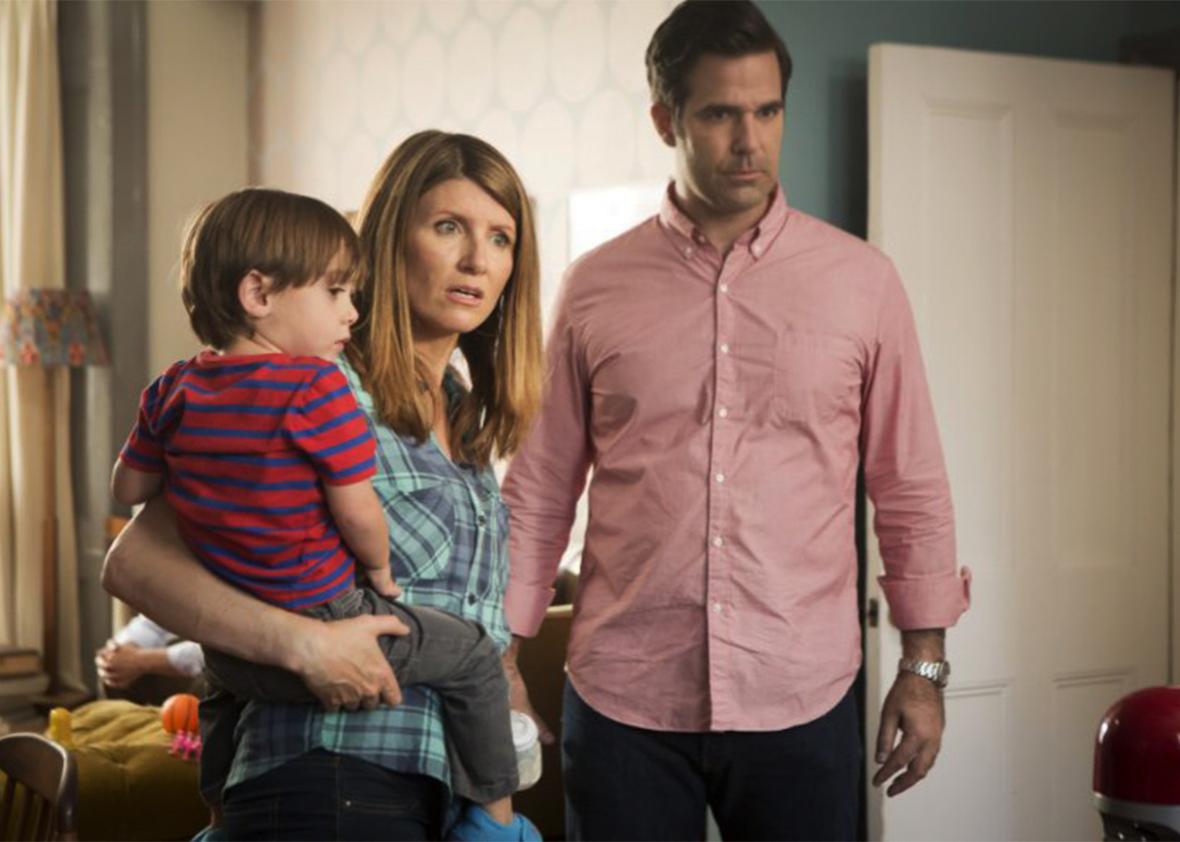The sitcom that has brought me more pleasure than any other TV comedy so far this year has an episode that begins with a couple slogging their way through a bitter, petty argument and ends with a man scooping his dead dog into a black plastic bag. The rest isn’t much perkier—he spends his days at a soul-eating job; their relatives are needy and annoying; their friends are a miserable, messed-up bunch—but it is glorious, and hilarious to watch, because the couple in question are Rob and Sharon of Catastrophe, back on Amazon for a second season Friday.
Rob Delaney and Sharon Horgan, who wrote and created Catastrophe along with starring in it, are utterly irresistible because they are just as mean, judgy, and exasperated by life as us mean, judgy, exasperated saps slumped on our couches watching them—and they’ve had the great good fortune to find someone equally mean, judgy, and exasperated to share their lives with. When they’re in each other’s company, Rob and Sharon get to say out loud the things most of us keep confined to the insides of our skulls: the unkind thoughts and catty observations that normal people are offended by and, worst of all, don’t laugh at. Catastrophe offers an answer to one of the great koans of our age: “What happens when people stop being polite and start getting real?”
Of course, honesty can be an excuse for cruelty—and the verbal arrows Rob and Sharon loft skyward sometimes land hard and leave scars. I wouldn’t be overjoyed if my partner reacted as Sharon does to the surprise treat Rob has planned for their anniversary celebration: “What did you do? Throw darts at a shit-ideas board?” she asks. But better out than in, I guess. In a moment of frustration deep into the six-episode season, Sharon tells Rob: “Not everyone has to like you. You’re not a puppy. You’re an adult man with a wife. Honest people who tell people how they feel when they feel it have people not like them. That’s what I do.” To which Rob replies, “No shit.”
Methinks she doth protest too much. Their harsh words are a coping mechanism, a much-needed pressure-release valve in an ever-more-stressful life. Sharon grumbles about her aging father, who’s starting to show signs of dementia, but she has the grace to do it behind his back, and everyone knows she’ll be there for him as his condition worsens. She complains to Rob about his visiting mother (a fabulous Carrie Fisher) but is as gracious a host as anyone could possibly be to such a self-centered underminer. Rob makes his living pushing nightmarish pharmaceuticals, but he knows exactly how heinous his job is. They’re not, in fact, unlikable people; they’re lovely, kind, big-hearted adults with a lot of problems on their plate.
Catastrophe doesn’t shy away from those problems. In fact, it revels in them. The people of Catastrophe vomit, and their vomit is the cascading, carrot-chunked stuff you seldom see on television—even English television, where the show first aired. They also have sex, which is sometimes loud and glorious and sometimes asymmetrically satisfying and almost never romantic but which overall seems like the kind of intimate connection couples dream of. They’re older parents, now with two small children, who deprive them of sleep and agency and fill their lives with a pure, uncomplicated love they don’t quite know how to cope with. These might be #firstworldproblems, but they’re overwhelming all the same.
This couple has never had it easy: In Season 1, a mad fling led to a high-risk “geriatric pregnancy” and a quickie marriage. In Season 2, many of those early worries—about whether Rob could successfully uproot himself from Boston and relocate to London; if they were crazy to even try to make a life together—are still present, but even more keep getting added to the pile. After their second baby is born, Sharon’s frustration at being home with the kids joins money worries and family crises and drug-addled friends until the big ball of stress starts to get too big for them to handle, and the relationship is threatened. The rot sets in when they stop telling each other everything. Life may not be a bowl of cherries—but it’s way more fun when you have someone to bitch about the rotten fruit to.
